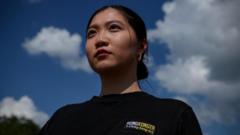Joe Tay, an actor and journalist, is competing in Canada’s upcoming federal election. However, he has chosen not to engage in traditional campaigning methods due to fears for his safety. The Chinese government has issued an arrest warrant for Tay, placing a $130,000 bounty for information leading to his capture. His outspoken criticism regarding China's actions in Hong Kong and its growing authoritarianism has made him a target.
In the days leading up to the election, Canadian officials disclosed that Tay has been subjected to coordinated online disinformation campaigns aimed at tarnishing his reputation on Chinese-language platforms. These attacks have sought to portray him as a criminal and suppress support for his candidacy. Vanessa Lloyd, the head of Canada's intelligence agency, highlighted that the narrative against Tay is being amplified by the People's Republic of China, particularly targeting Don Valley North, a constituency with a significant Chinese community.
As Tay navigates this perilous landscape, his situation serves as a reminder of the international ramifications on local elections, illustrating how geopolitical tensions can have a direct impact on democratic processes within Canada.
In the days leading up to the election, Canadian officials disclosed that Tay has been subjected to coordinated online disinformation campaigns aimed at tarnishing his reputation on Chinese-language platforms. These attacks have sought to portray him as a criminal and suppress support for his candidacy. Vanessa Lloyd, the head of Canada's intelligence agency, highlighted that the narrative against Tay is being amplified by the People's Republic of China, particularly targeting Don Valley North, a constituency with a significant Chinese community.
As Tay navigates this perilous landscape, his situation serves as a reminder of the international ramifications on local elections, illustrating how geopolitical tensions can have a direct impact on democratic processes within Canada.



















